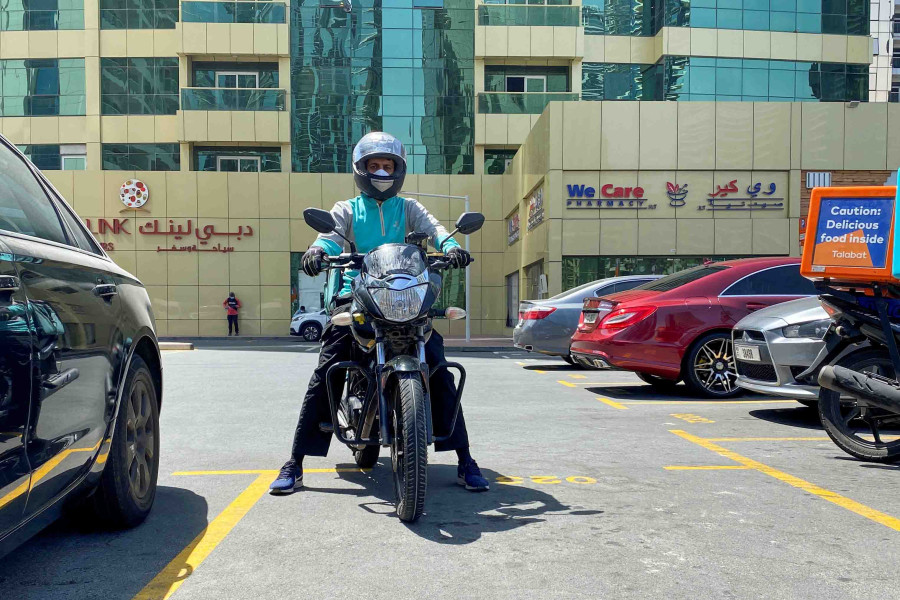Money
Out of job, Nepali delivery riders in UAE await help
The migrant workers say they paid recruiting agencies in Nepal Rs250,000 to Rs315,000 each in the hopes of making over Rs100,000 a month.
Pawan Pandey
Janak Chamling Rai had never imagined he would one day become a migrant worker waiting to be rescued after being jobless for months in a faraway land.
So did Sandip Dhimal, Roshan Dangal, Roshan Sitaula, Dinesh Majhi and Bishal Singh Thakuri.
While Rai, Dhimal, Sitaula and Majhi were sent by Baba Human Resource Management for a delivery rider job in the United Arab Emirates, Dangal and Thakuri were recruited by Link International Placement Services, they say.
The six individuals went to the UAE, one of Nepal’s major labour destinations, around a year ago.
According to the workers, they paid Rs250,000 to Rs315,000 each their recruitment agencies to get the job.
The amount is 30 times what the existing provision allows a recruitment agency to charge Nepali workers going to Malaysia, Qatar, Saudi Arabia, United Arab Emirates, Kuwait, Bahrain and Oman.
The free-visa-free-ticket policy which the Nepal government enforced in July 2015 is supposed to obligate employers from the seven countries to bear the cost of visa processing and air ticket to hire workers from Nepal.
While migrant workers, as per the policy, have to bear the cost of pre-departure orientation training, health check up and migrant workers’ welfare fund, they are required to pay Rs10,000 to recruiting agencies as a service charge if their employers refuse to bear the cost.
But, almost eight years after its introduction, it has mostly remained on paper.
“I paid Rs310,500, which I managed through loans at 24 to 36 percent interest rates,” said Rai who hails from Dorpachiuridada village in Diktel Rupakot Majuwagadhi Municipality-7, Khotang. “I paid Rs50,000 to a sub-agent and the remaining amount to Baba Human Resource Management at their office in Kathmandu.”
The existing provision also makes it illegal for a recruiting agency to hire sub-agents.
Rai claimed the agency did not allow the workers from taking photos when they paid the hefty amount, by threatening them to scrap their labour migration process.
The migrants say they paid the amount hoping to make around Rs100,000 a month in the UAE. “We were promised a monthly salary of AED 3,000 (around Rs107,000), but we remained jobless for months,” they say.
“They told us we would get the driving licences in two months after reaching the UAE, but it took around six months,” said Sitaula, who hails from Damak, Jhapa.
“We remained jobless for six months after arriving in the UAE,” said Dhimal, who is from Urlabari in Morang district. “It took us some time to realise that the jobs we had been hired for were only commission based ones.”
The offer letter which Rai signed with Uplift Delivery Services mentions that his monthly salary will be commission based or fixed AED 3,000 depending on the availability of jobs.
According to the letter, his monthly salary has been broken down as AED 1,050, AED 300 and AED 200 for basic salary, housing allowance and food allowance respectively.
Beside these, the letter mentions that Rai would get a fixed overtime pay of AED 500 per month, AED 650 as other allowances and AED 300 for fuel expenses.
But Rai says he refused to work after realising it was a completely commission-based job.
“I have remained jobless for more than a year now and have been living with friends in Abu Dhabi,” Rai added. “I could have gotten other jobs if I had my passport.”
The workers say they have not been in possession of their passports after they underwent medical check ups soon after landing in the UAE.
Dhimal and other workers did work for a couple of months after getting their licences, but the income was not even enough to cover their food and housing expenses.
Besides, they also had to pay for fuel while on delivery jobs.
According to Dhimal, they worked for the delivery app Talabat to deliver food from restaurants, before it fired them for not having insurance.
“We used to get AED 7.5 in commission for every delivery,” Dhimal said.
The Department of Foreign Employment, the government agency which oversees labour migration, recently decided to temporarily halt the issuance of prior approval for recruiting agencies for sending bike riders and taxi drivers to Qatar and Dubai, amid rising complaints regarding issues in getting driving licence, joblessness, unpaid salaries, traffic accidents as well as fines involving Nepali workers.
Krishna Prasad Bhusal, information officer at the Department of Foreign Employment, told the Post in a recent interview that there have been more complaints from Dubai in recent days.
A group of 160 migrant workers in Qatar, scores of whom have been working exclusively for the food delivery service Talabat, were subjected to wage theft, in some cases going unpaid for as long as 8 months, reported FairSquare, a non-profit human rights research and advocacy group, recently.
“The parent company of Talabat is the German company Delivery Hero,” according to FairSquare.
Sambhu Gautam, manager at Baba Human Resource Management, denied all the accusations made by migrant workers.
“We have sent many workers, but a few have made accusations against us after losing interest in their jobs,” said Gautam. “The problem has arisen because of their inability to work effectively in delivery jobs.”
Gautam claimed that some of the workers they sent have earned AED 4,200 in a month at most. “But, it is obvious that the lazy workers and those employed in areas which get less delivery orders do not earn much.”
Though Gautam claims that the recruitment agency has representatives in the UAE – who are always available to listen to workers’ grievances – workers argue that they have turned a deaf ear to their concerns.
“They have been ignoring our calls,” said Dhimal.
The workers want to be rescued, but the representatives of the manpower agency have demanded at least AED 4,000 from each of them to get their passports back, they say.
“They say it is half of the amount they spent on our visas and licences when we were hired and they have to recover it,” said Sitaula. “Some workers who could pay the amount have returned home, but how can we manage to pay such a huge amount when we have been jobless for months."
According to Gautam, AED 7,000 per worker was spent to get their driving licence. “It was to be covered from the workers’s salary in instalments,” Gautam said. “But some workers did not even show up for work.”
“There have also been cases of Nepali workers fleeing to Romania or other European countries after getting a driving licence in the UAE,” Gautam added.
Rajan Paudel, information officer at the Foreign Employment Board, the government agency responsible for welfare of Nepali migrant workers, said the workers will have to file an application at the Department of Foreign Employment first through their family members at home if they have not been employed as per the contract and want to be rescued.
“The Department of Foreign Employment then makes the concerned recruiting agency rescue the workers and compensate them,” said Paudel. “But if a worker’s labour permit has expired and left stranded in a destination country without any support from the recruitment agency, the individual will have to visit the Nepali embassy, which has a labour attache to look into the matter.”
“The individual will be then kept in a shelter in the destination country and flown back home by the Foreign Employment Board,” Paudel added.
The workers, however, said they have tried seeking help from the Embassy of Nepal in Abu Dhabi, but to no avail.




 16.12°C Kathmandu
16.12°C Kathmandu














